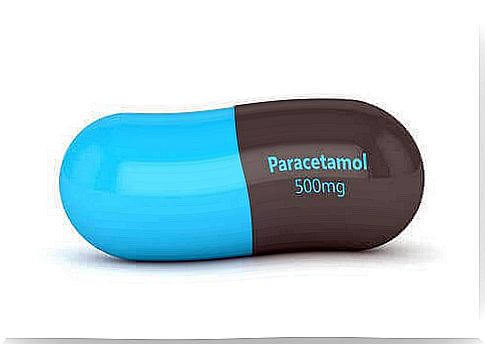Is It Safe To Take Paracetamol During Pregnancy?

The consumption of paracetamol during pregnancy is a controversial topic and there are many conflicting opinions about it.
You may not be aware of it, but paracetamol, as an over-the-counter drug, is one of the best-selling drugs in the world. The problem is that people are often unaware of its side effects and contraindications.
Until recently, the recommendations for the consumption of paracetamol during pregnancy indicated that it was dangerous to use it. Based on clinical trials, however, there is no evidence of a link between drug use and an effect on the urogenital system. Nor is there any in relation to changes in the baby’s neurodevelopment.
Paracetamol during pregnancy: Consumption and effects
This widely used drug has analgesic and antipyretic properties. It thus reduces pain and fever. It is similar to aspirin, except that it neither reduces inflammation nor has an antithrombotic effect.
Because of these restorations, people use paracetamol to reduce moderate, acute and chronic pain. It is the preferred painkiller by most doctors when it comes to patients older than 50 years.
No one knows exactly how paracetamol works, even though we know it works centrally. There is a widely accepted hypothesis in the scientific community that paracetamol raises the pain threshold by inhibiting COX enzymes. These are the molecules that participate in the synthesis of prostaglandins.
Prostaglandins are pain-related proteins. However, paracetamol is not able to inhibit COX enzymes at the peripheral level – outside the central nervous system.
It is for this reason that it has no anti-inflammatory activity. Paracetamol also inhibits the synthesis and effects of several chemical mediators that sensitize pain receptors to mechanical or chemical stimuli.
In terms of its effectiveness in reducing fever-related symptoms, paracetamol is able to block the area of the brain that controls body temperature. It therefore manages to dissipate heat by causing vasodilation and increasing sweating and the peripheral flow of blood.

Side effects of paracetamol
Paracetamol is toxic to the liver (toxic to the liver). In most cases, however , this toxicity is the result of either an overdose or chronic overdose. Paracetamol-induced liver toxicity manifests as:
- Liver failure
- Jaundice, which is yellowish discoloration of the skin and mucous membranes
- Bleeding in the digestive system and bruising on the skin
- Liver encephalopathy
In addition to this toxicity, it can also produce other side effects, such as:
- Neutropenia (fewer white blood cells)
- Hives and other allergic reactions
Recommendations for the use of paracetamol during pregnancy

When a company markets a drug, it has to go through a series of studies to assess its long-term safety. This is also to detect hazards that were not yet discovered in previous studies.
During this evaluation period for paracetamol, they are also doing more research into the dangers it poses to a fetus in pregnant women taking paracetamol. The results of these studies are mentioned in the package leaflet for medicines containing this active ingredient.
The Danish Health and Medicines Authority advises that you reduce your consumption of medicines during pregnancy. Based on studies, however, paracetamol is considered a safe drug to use during pregnancy, as it neither has an effect on the urogenital system nor leads to disorders associated with the development of the baby.
Conclusion
In short, a pregnant woman can take paracetamol under the supervision of a doctor, and as long as it is not abused. Pregnant women should be careful when using medication and avoid self-medication under any circumstances.
When in doubt, always talk to a doctor about it.









